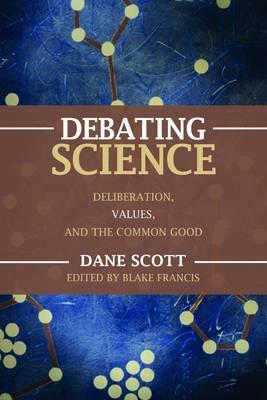Overview
This is an insightful collection of essays exploring the need for ethical and constructive discussion of scientific and technological innovations and research. As science becomes ever more powerful in the 21st century, it is likely that controversies will increase over the ethics of its applications. Powerful new technologies will have enormous social and ethical implications. This anthology by accomplished scholars and noted experts focuses on ethical deliberation and the larger moral context surrounding the controversies over scientific research and technical innovations - emphasizing deliberation rather than adversarial debate. This much-needed resource will help readers become better informed on science generally and will promote constructive discussions on the values at stake in contemporary debates over scientific research and emerging technologies.
Full Product Details
Author: Dane Scott ,
Francis Blake
Publisher: Prometheus Books
Imprint: Prometheus Books
Dimensions:
Width: 15.40cm
, Height: 1.60cm
, Length: 22.90cm
Weight: 0.400kg
ISBN: 9781616144999
ISBN 10: 1616144998
Pages: 277
Publication Date: 20 December 2011
Audience:
General/trade
,
General
Format: Paperback
Publisher's Status: Out of Print
Availability: Awaiting stock

Reviews
This is a terrific book, stimulating, provocative, enjoyable. I learned a huge amount about science and values, and how these sorts of things really matter in education and the marketplace. I recommend it strongly. -MICHAEL RUSE, author of Defining Darwin Almost transcending its title, this collection lives up to its promise of ethical deliberation that is more productive than polarizing, adversarial debate. The range of topics is inclusive: disease and health, agriculture and food, biodiversity, science and policy, regulation, public funding of science, and science and economics. The contributors consider equity and efficiency in science, science and justice, advocacy, uncertainty, complexity, sustainability, climate change, genetically modified organisms, nanotechnology, and engineering. Always, the skillful authors argue with care--care about their arguments, care about their causes, and concern for fairness. Here we move past winning a zero-sum game, or accepting compromise, to creatively cooperating for a richer community. -HOLMES ROLSTON III, University Distinguished Professor and Professor of Philosophy Emeritus, Colorado State University
This is a terrific book, stimulating, provocative, enjoyable. I learned a huge amount about science and values, and how these sorts of things really matter in education and the marketplace. I recommend it strongly. <br>-MICHAEL RUSE, author of Defining Darwin<br><br> Almost transcending its title, this collection lives up to its promise of ethical deliberation that is more productive than polarizing, adversarial debate. The range of topics is inclusive: disease and health, agriculture and food, biodiversity, science and policy, regulation, public funding of science, and science and economics. The contributors consider equity and efficiency in science, science and justice, advocacy, uncertainty, complexity, sustainability, climate change, genetically modified organisms, nanotechnology, and engineering. Always, the skillful authors argue with care--care about their arguments, care about their causes, and concern for fairness. Here we move past winning a zero-sum game, or accepting compromise, to creatively cooperating for a richer community. <br>-HOLMES ROLSTON III, University Distinguished Professor and Professor of Philosophy Emeritus, Colorado State University
This is a terrific book, stimulating, provocative, enjoyable. I learned a huge amount about science and values, and how these sorts of things really matter in education and the marketplace. I recommend it strongly. -MICHAEL RUSE, author of Defining Darwin Almost transcending its title, this collection lives up to its promise of ethical deliberation that is more productive than polarizing, adversarial debate. The range of topics is inclusive: disease and health, agriculture and food, biodiversity, science and policy, regulation, public funding of science, and science and economics. The contributors consider equity and efficiency in science, science and justice, advocacy, uncertainty, complexity, sustainability, climate change, genetically modified organisms, nanotechnology, and engineering. Always, the skillful authors argue with care--care about their arguments, care about their causes, and concern for fairness. Here we move past winning a zero-sum game, or accepting compromise, to creatively cooperating for a richer community. -HOLMES ROLSTON III, University Distinguished Professor and Professor of Philosophy Emeritus, Colorado State University
Author Information
Dane Scott is director of the Centre for Ethics and associate professor of society and conservation at the University of Montana-Missoula. Blake Francis is a PhD student in the Department of Philosophy at Stanford University.




